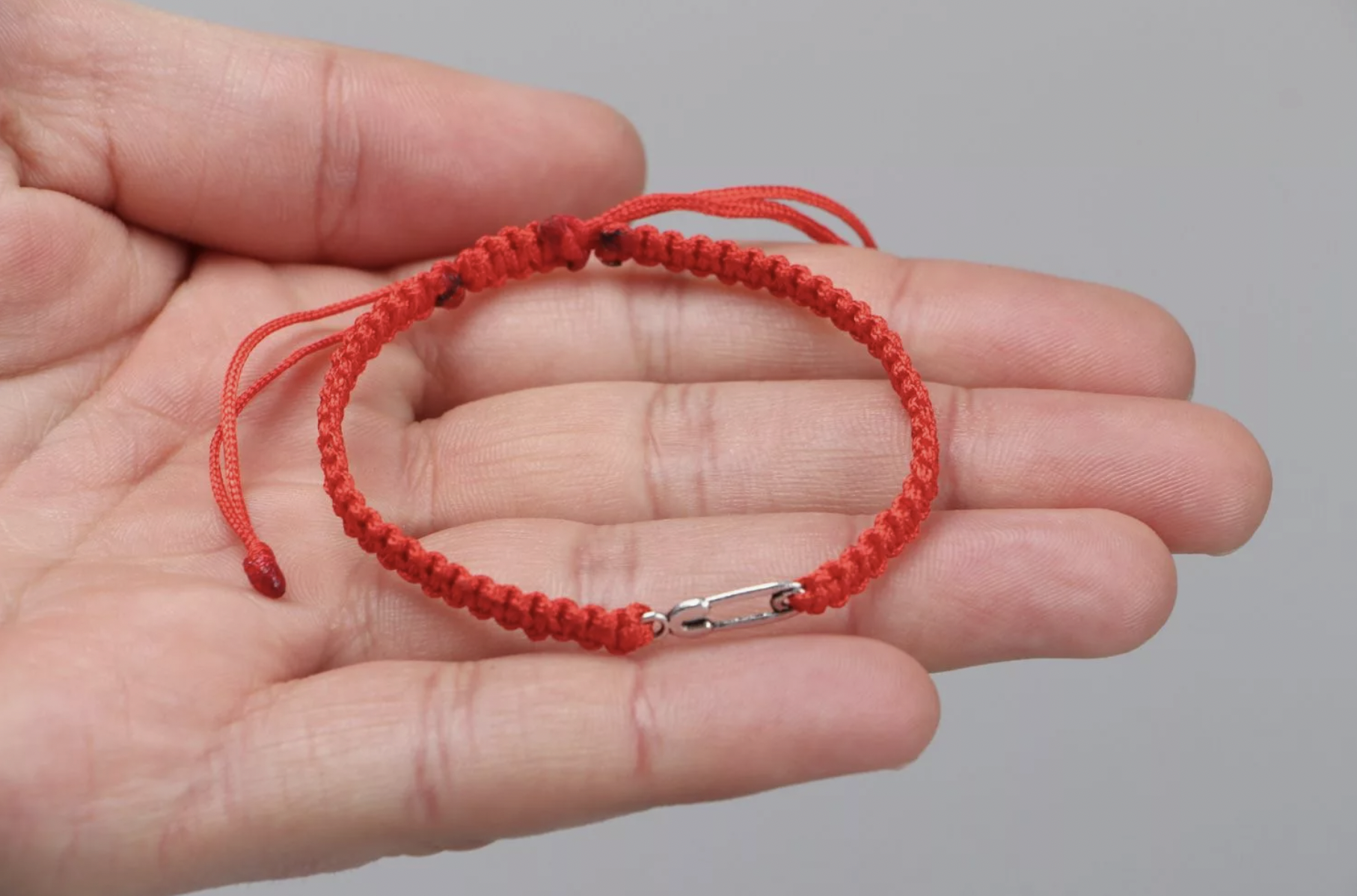
I Found a Red Thread on My Door Handle Every Day Until I Froze to Learn What It Meant
Joan arrives with her daughter at the new home she bought in a small town. It represents a new beginning for them, but a small red thread on their door threatens to bring back the ghosts of the past. The neighborhood is far from welcoming to Joan's family, forcing her to fight for her new life.
The sun hung low in the sky, its light stretching long over the quaint houses that dotted the landscape of the small town, a place where time seemed to saunter rather than sprint.
The pickup truck trundled along the narrow road, gravel crunching beneath its weight. Joan's hands, calloused from years of wielding brushes and chisels, gripped the steering wheel with purpose, her gaze fixed on the rearview mirror where the precious cargo in the trunk lay hidden beneath tarps and netting.
"Have we arrived yet?!"
Lizzy's voice sliced through the silence that had settled inside the cab like dust. With eyes as bright as the morning dew and a spirit unbroken by the world's harsh edges, she perched on the edge of her seat, a portrait of anticipation.

For illustration purposes only. | Source: Shutterstock
The road stretched before them, an unending canvas of grey, lined with the hopeful green of new beginnings. Joan's hands were steady on the wheel, each turn a stroke of determination in the masterpiece of their future. The truck rumbled beneath them, a faithful beast burdened with the artifacts of a life in transit.
"Daughter, asking that for the tenth time won't get us there any faster…"
The words left Joan's lips, tinged with the weariness of countless miles traveled and the echoes of a daughter’s anticipation. In the rearview mirror, Lizzy's face was a tableau of impatience, eyes wide with the thirst for discovery. The truck rolled to a stop, its engine sighing into silence.
"And now? Have we arrived now? Is this our home?"
Lizzy's voice was a delicate thread, weaving through the air, filled with the innocence that Joan had vowed to nurture and defend.

For illustration purposes only. | Source: Shutterstock
Joan paused, allowing herself a moment to absorb the question, to feel the weight of their shared journey. A nod was her silent reply, her affirmation a quiet promise etched into the fabric of this fresh chapter.
Lizzy bounded from the truck, her movements painting the world with bold strokes of youthful exuberance. Joan lingered by the driver's side, the contours of her new surroundings slowly seeping into her consciousness.
The houses stood like silent sentinels, guardians of the status quo, their gazes following Joan as she carefully unloaded her cargo.
The gravel crunched under the tires, a symphony of finality as Joan's pickup truck eased to a halt. Lizzy's question still hung in the air like a note waiting to resolve. Joan's right eye betrayed a spasm of fatigue before she mustered the fortitude to reply through clenched teeth
"Yes... We've arrived."

For illustration purposes only. | Source: Shutterstock
No sooner had the affirmation left her lips than Lizzy, a whirlwind of elation, flung open the door and darted into the embrace of their new world.
Joan released a heavy sigh that seemed to carry the burdens of their past, her gaze tracing the outline of their future dwelling—a modest structure nestled between the familiar and the unknown.
Carefully, Joan exited the vehicle, her movements deliberate, as if each step was a silent declaration of intent.
The home before her stood unassuming yet defiant, much like Joan herself—a bastion against the encroaching tide of societal norms, a canvas awaiting her touch.
"New Home sweet home,"
Joan murmured, her words painting the air with a blend of hope and irony. She stood there, a solitary figure against the backdrop of an unwritten story, ready to color outside the lines.

For illustration purposes only. | Source: Shutterstock
Joan's fingers curled around the edge of the canvas, a protective shield over one of her more provocative pieces.
Her palm grazed the textured surface beneath its shrouding cloth, feeling every rise and dip as an intimate secret shared between creator and creation. She hefted the frame from the truck bed with an artist’s care and a laborer's resolve.
"Dear! Don't go far!" she called out, her voice threading through the still air. From the porch, Lizzy's response came back, playful yet obedient, "Yes, Mooooom."
Neighbors had gathered, their eyes flickering with curiosity and something else—something unspoken. Joan raised her hand in greeting, offering a smile tempered by the knowledge that it would not be reciprocated.
Indeed, their stares remained fixed, unreadable sculptures in a gallery of judgment.
The weight of boxes and furniture did little to deter Joan; each trip from pickup to porch was a testament to her self-reliance.

For illustration purposes only. | Source: Shutterstock
Her biceps tensed under the strain, muscles forged in the fires of necessity and pride. This was her dance—a ballet of endurance, each step choreographed by sheer will.
The murmur of voices drew her attention, a discordant note intruding upon her solitary rhythm.
"Hello! And who's this little princess!"
The words grated against Joan's sensibilities, an unwelcome label foisted upon her daughter. She approached with measured strides, her gaze locking onto the source.
"Hello! I'm your new neighbor, Joan."
Her hand hung suspended, an offering of civility left unclaimed. Nellie and Ellie exchanged glances, a silent conversation in which Joan felt she was both subject and alien.
Nellie's introduction was polite, but her tone carried echoes of a bygone era when women were seen and not heard. Ellie's appraisal of Joan's attire—a silent indictment of her choice to wear pants—spoke volumes of the generational divide between them.

For illustration purposes only. | Source: Shutterstock
"So many things, and you're carrying them all by yourself, Joan? You could use a pair of strong male hands,"
Nellie observed, a barb wrapped in concern. Joan's jaw tightened, the sting of the remark igniting a familiar fire within her.
"Go inside, honey," she instructed Lizzy, her voice a gentle command. With her daughter safely away, Joan beckoned the onlookers, a sly curl to her lips.
"I can't help but share my passion with you; I'm an artist and would really like you to see one of my favorite paintings."
The cloth fell away, revealing the unabashed celebration of the female form. It was art, it was defiance, it was a declaration. To Nellie and Ellie, it was anathema.
"What a disgrace! You should be ashamed, young lady! Come on, Ellie, we have nothing to talk about with this licentious woman." Their retreat was swift, their indignation trailing behind them like the tail of a comet.

For illustration purposes only. | Source: Shutterstock
Joan watched them go, her smile unfaltering. There, in the narrow space between acceptance and outrage, she found her peace—a woman unbound by expectation, free to revel in the honesty of her work, her love, her very being.
The incessant shrill of the alarm clock tore through the stillness of Joan’s bedroom, a tune that had become the bane of her mornings. Groaning, she fumbled in the semi-darkness, her hand patting the nightstand in a clumsy ballet.
The elusive gadget continued its taunting beep.
"Damn it, just shut up already!" she hissed under her breath, frustration boiling as sleep clung to her like cobwebs.
With a stroke of luck more than precision, her fingers finally collided with the device, silencing the cacophony. A relieved sigh escaped her lips as she relished the sudden silence.
"Mom! Mom! What is this MOM!?"

For illustration purposes only. | Source: Shutterstock
Lizzy's voice, tinged with urgency, pierced Joan's fleeting moment of calm. This time, Joan's eyes snapped open, fully alert.
"What is it this time, dear..."
She sat up, the weight of sleep lifting from her shoulders as Lizzy burst into the room, brandishing an object that instantly sent a ripple of unease through Joan.
In her small hands, Lizzy clutched a strange red thread, its fibers woven into knots that hinted at intention rather than random entanglement.
It looked sinister, reminiscent of a voodoo doll—a harbinger of malice. "Where did you find it!?" Joan's voice was sharp, her artist's eye dissecting the oddity before her.
"On the door, on our door... Mom, I didn't know what it was, mom, I just wanted to show you," Lizzy's words tumbled out in a rush, her chestnut hair framing a face so like Joan's own—etched with concern.
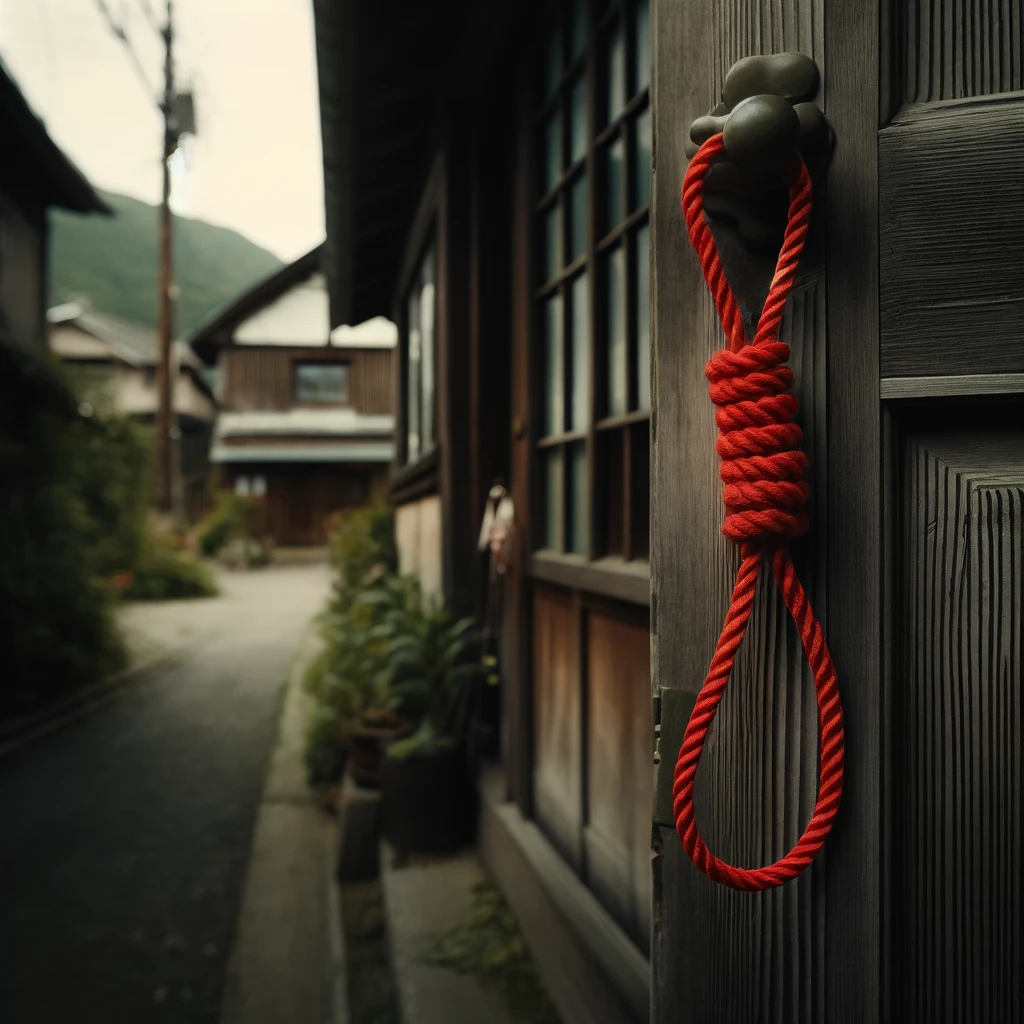
For illustration purposes only. | Source: Dall-E
Joan reached out, smoothing back her daughter's waves with a gentle hand, the maternal instinct to protect rising within her.
"It's okay, sweetheart. We'll figure this out," she murmured, her tone steady despite the storm of questions raging in her mind.
Clad in determination and her favorite worn jeans, Joan guided Lizzy through their morning routine with a practiced ease that belied the growing trepidation in her gut.
With each button fastened and shoelace tied, she fortified herself against the unknown. Today, she would confront the mystery head-on, not merely for her peace of mind but for the safety of her fierce little world contained within these four walls.
Once Lizzy was settled with breakfast and a kiss on the forehead, Joan stepped out the door, the red thread clenched in her fist—a symbol of defiance against the unseen forces conspiring against them.

For illustration purposes only. | Source: Shutterstock
Her strides were purposeful, carrying her towards the one person in town whose wisdom might unravel the secrets of the twisted token that dared to mar her doorstep.
The morning's confusion had settled into a gnawing unease as Joan marched up to Nellie Thompson's weatherworn doorstep.
Her knocking was assertive, each rap of her knuckles echoing a silent demand for answers. The door inched open, revealing only a sliver of the world Nellie guarded so fiercely behind it.
"Open the door! What kind of games are you playing here?" Joan's voice carried an edge sharpened by worry and the need for clarity.
"Go away! I don't want to talk to you," came the curt reply from within, Nellie's eyes—sharp like chipped flint—peeking through the narrow opening.
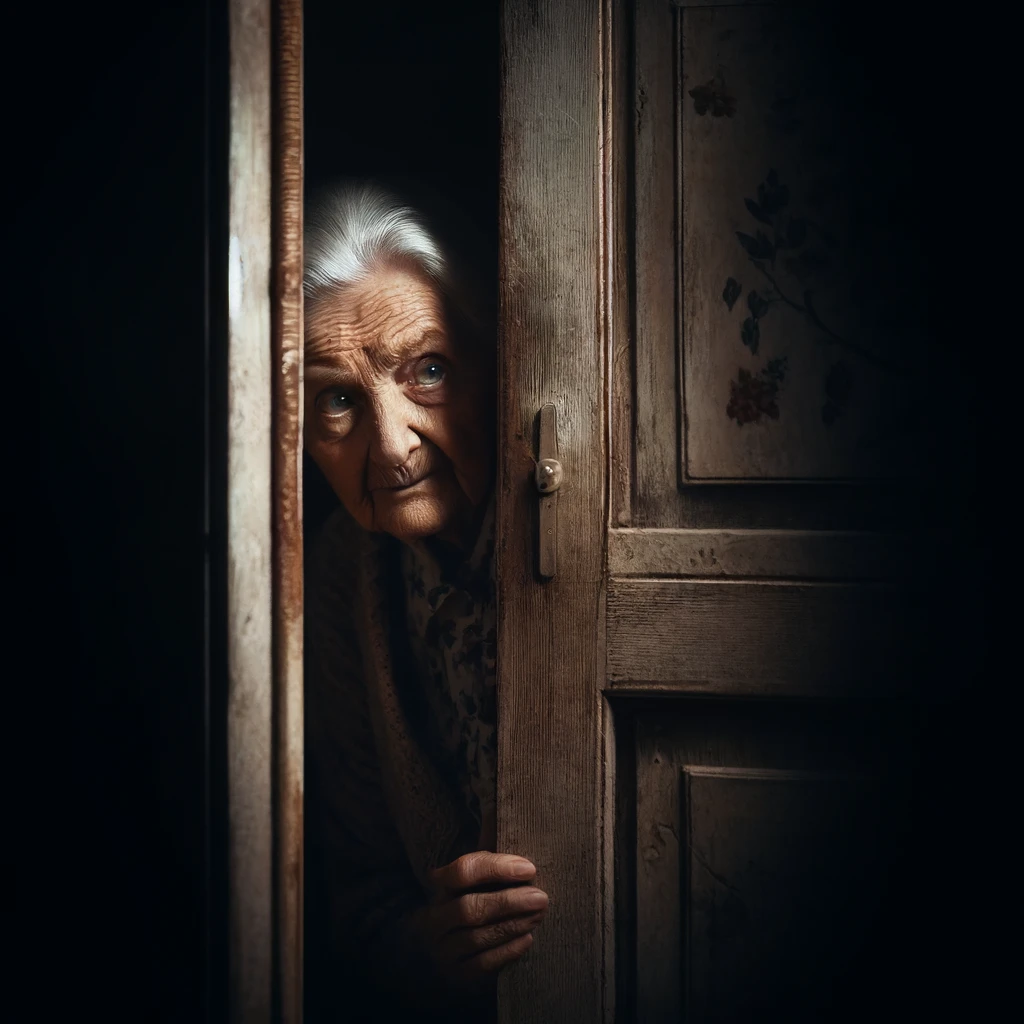
For illustration purposes only. | Source: Dall-e
Joan hesitated, the bite in Nellie's tone striking a chord of regret for yesterday's quarrel, however necessary it had felt at the time.
"Sorry about yesterday, but someone hung this voodoo string on my door," she said, extending her arm to show the red thread that had been the catalyst for her visit. "What is this even? Is this some kind of tradition of scaring your neighbors?"
Nellie's eyes widened at the sight of the string, and Joan could almost taste the old woman's surprise.
"I don't know who did it, but it doesn't bode well for you. Everyone who received this string hasn't stayed in our town for more than a week. I recommend you look for a new house."
The door shut with finality, the sound resonating in Joan's chest like the dull thud of defeat. But as she stood there, the red thread dangling from her fingertips, laughter bubbled up from within her—a clear, defiant sound that scattered her fears like leaves in the wind. She tossed the string aside, unwilling to let superstitions dictate her life.

For illustration purposes only. | Source: Dall-E
Night descended with a swift chill, draping Joan's home in shadows that seemed too eager to press against the windows.
The noise pulled her from sleep—the unmistakable scrape and thud of something amiss in the basement where her paintings, the silent witnesses to her soul's outpouring, lay stored.
"Mom! Mom!" Lizzy's voice was a high-pitched thread of fear that pierced the heavy cloak of darkness.
"Quiet, quiet, dear," Joan whispered, struggling to cloak her own rising panic in a shawl of calm.
She willed her voice to be an anchor in the turbulent sea of dread that threatened to engulf them both. Her heart hammered against her ribs, a caged bird frantic to escape, as the truth clawed at her mind: someone had violated their sanctuary.
Joan's fingers closed tightly around Lizzy's, her grip a lifeline as they navigated the darkened hallway. The soft rustle of their pajamas was an eerie accompaniment to the thudding of Joan's heart, each step a silent plea for safety.

For illustration purposes only. | Source: Shutterstock
The red threads on every door loomed like sinister omens, taunting her with their silent presence. They felt alien, invasive—a stark contrast to the home Joan had painstakingly created.
"Stay close, Lizzy. Hold my hand and don't let go," Joan murmured, her voice a hushed command that carried more fear than she intended. Lizzy's small hand trembled within her own, a tangible echo of Joan's inner terror.
They descended the stairs to the basement, the air growing colder with each step. The darkness seemed to swallow them whole, a gaping mouth ready to consume their resolve. It was only when Joan flicked the switch that the full horror revealed itself in the harsh glare of the overhead bulb.
All around, her paintings lay in tatters, the canvases she had lovingly caressed with color and life now shredded by an unseen fury.
And there, scrawled across the wall in dripping red that might have been mistaken for paint—but wasn't—was a single word: "Whore."
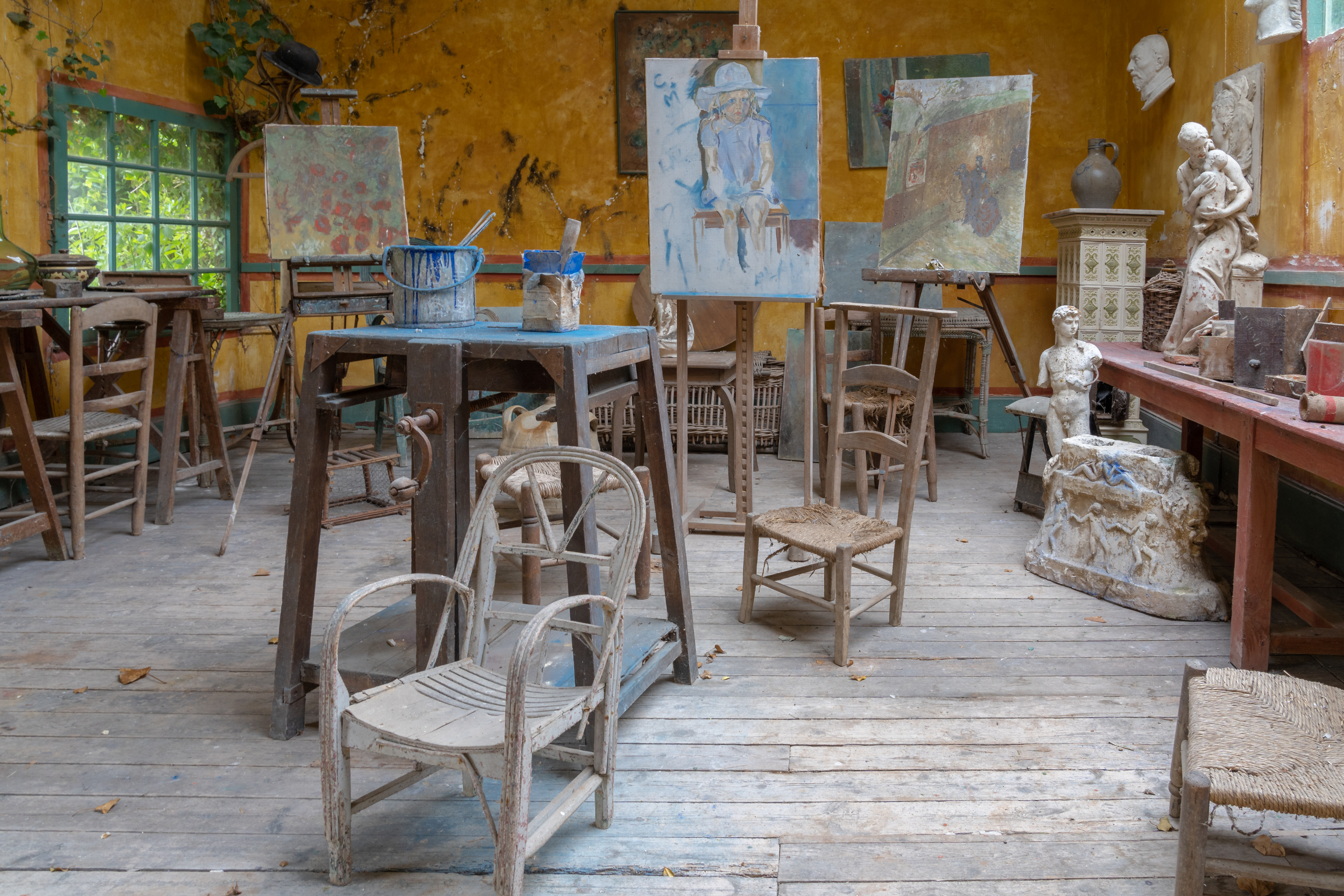
For illustration purposes only. | Source: Shutterstock
Joan's breath caught in her throat, a strangled sound of disbelief and pain. She stumbled backward, her daughter's hand slipping from her grasp as she fled the scene of devastation.
Upstairs, the chill of the night could not compare to the ice in Joan's veins as she dialed the police with shaking hands.
"Someone broke into your house and damaged your personal belongings," Sheriff Tony stated, his tone detached as if discussing a trivial inconvenience rather than a violation of sanctuary.
"Damaged? All my paintings are destroyed? Do you even understand how much time and money I put into them!?" Joan's voice rose, a crescendo of outrage and despair that demanded to be heard.
Sheriff Tony, his face impassive, picked up a fragment of canvas, examining it with feigned interest before shrugging dismissively.
"Well, judging by what's left, not much." Laughter bubbled up from the officers behind him, a chorus of mockery that stung worse than the attack itself.

For illustration purposes only. | Source: Shutterstock
The accusation fell from Joan's lips before she could temper it, fueled by righteous anger. "I demand justice! Your inaction is complicit!"
"Your own fault," he retorted, his words slicing through the air like a blade. "Why provoke with your vulgar paintings? If you'd been normal, none of this would've happened."
"Normal" hung between them, a verdict passed down by those who deemed themselves gatekeepers of morality.
"Move out," he continued, punctuating each syllable with contempt. "Stop disgracing a respected person's home."
And with that, the police turned their backs on her, leaving Joan standing alone amidst the ruins of her dreams, the weight of injustice pressing down upon her shoulders like the world itself.

For illustration purposes only. | Source: Shutterstock
Joan Whitmore's fingers danced across her laptop's keys with the purposeful grace of a pianist, each click and clack a note in her solitary concerto.
It was late, the clock's hands creeping past midnight, yet sleep eluded her like an unwelcome critic dodging the debut of her latest gallery. The house creaked around her—a symphony of old wood and whispered history—as the glow of the screen painted her face in cold light.
"Stephen Ring," she murmured, her voice a brushstroke of disdain as the name filled the search bar.
The internet obliged, unfurling pages of results about the former owner of her new home. Stephen Ring, a writer whose legacy seemed as faded as the peeling paint on her living room walls.
His works were a series of treatises on society, particularly on the rules of conduct and women's rightful place within the confines of family life.
To Joan, these antiquated views were nothing more than relics, dust-covered tomes that belonged to a bygone era best forgotten.

For illustration purposes only. | Source: Shutterstock
But as her dark eyes skimmed through the text, a pang of discomfort settled in her chest. The village's virtual library had a section dedicated to him, his sepia-toned portrait displayed with reverence.
To these people, Stephen Ring was not the archaic figure she saw but a pillar of traditional values, a man to be proud of, heralded for his commitment to maintaining the 'moral fabric' of the community.
"Trash," she spat out, the word slicing the silence like a palette knife through canvas. Her art was all about challenging norms, splashing vibrant defiance onto blank spaces.
Meanwhile, this Ring—this ghost from the past—preserved those very chains she aimed to shatter with every stroke of her brush.
Joan leaned back in her chair, fingers pausing as she considered the small town that cradled her new beginning.
It was quaint, picturesque even, but beneath its charming veneer lurked shadows of Ring's ideology—silent yet insidious, like mold creeping along the edges of a once-pristine mural.

For illustration purposes only. | Source: Shutterstock
With a heavy sigh, she closed the laptop, the room returning to darkness save for the moonlight that fought its way through the curtains. She felt it then, the weight of countless gazes, generations of judgments pressing upon her, testing her resolve.
But Joan Whitmore was no damsel in distress; she was a warrior armed with conviction, ready to carve out her space in a world that often seemed too eager to close in around her.
"Let them be proud," she whispered into the stillness, her words a vow etched in the night. "I'll show them exactly what a woman can do."
Joan's cursor hovered over the link, a digital rabbit hole beckoning. She clicked, and an article from decades past filled her screen, sepia tones coloring the world of Stephen Ring. There, amidst the praises and reminiscences, was a photograph of young girls lined up in front of her now-home.
Their hair was pulled tightly back, their dresses ironed into submission, each one tied to the next with thin red strings — a macabre sort of pageantry that made Joan's skin crawl.
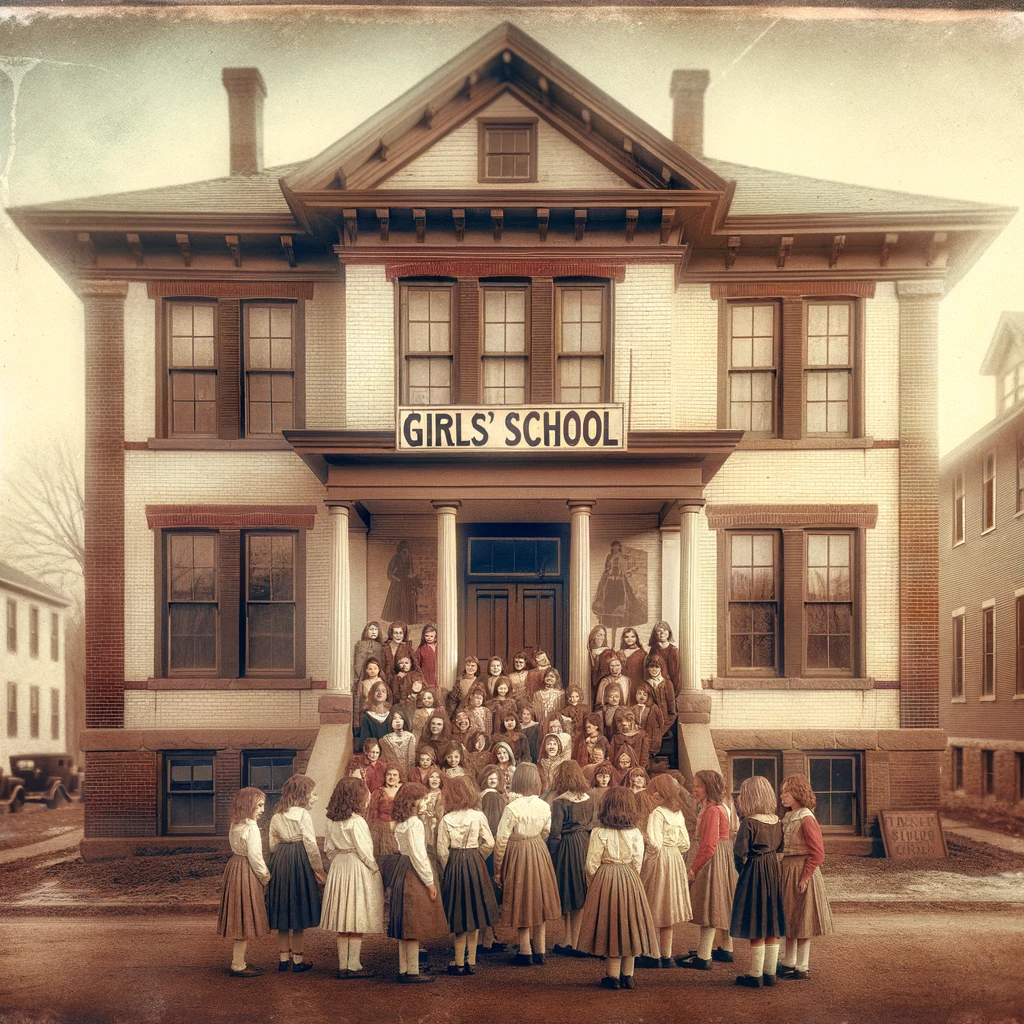
For illustration purposes only. | Source: DaLL-E
Those same sinister threads had welcomed her to the village, strung up like a warning or a curse near her door. The article detailed how quickly his 'School for Proper Ladies' had shuttered, leaving only whispers and speculation as to why.
And then, that chilling addendum: every subsequent owner had either fled, selling their sudden burden, or simply vanished, leaving behind nothing but questions swirling like fallen leaves in a forgotten garden.
She shuddered, shutting the laptop with a soft snap that seemed to echo through the stillness. As she climbed into bed, the darkness felt heavier, the night air thick with secrets and silence.
Dawn broke with an unsettling quietude. Joan stirred, her dreams having been a fitful collage of shadowy figures and crimson strings. A foreign rustle against her pillow drew her attention, and her fingers brushed against a slip of paper.
Her heart plummeted as she unfolded it, revealing the stark block letters: "You were warned."
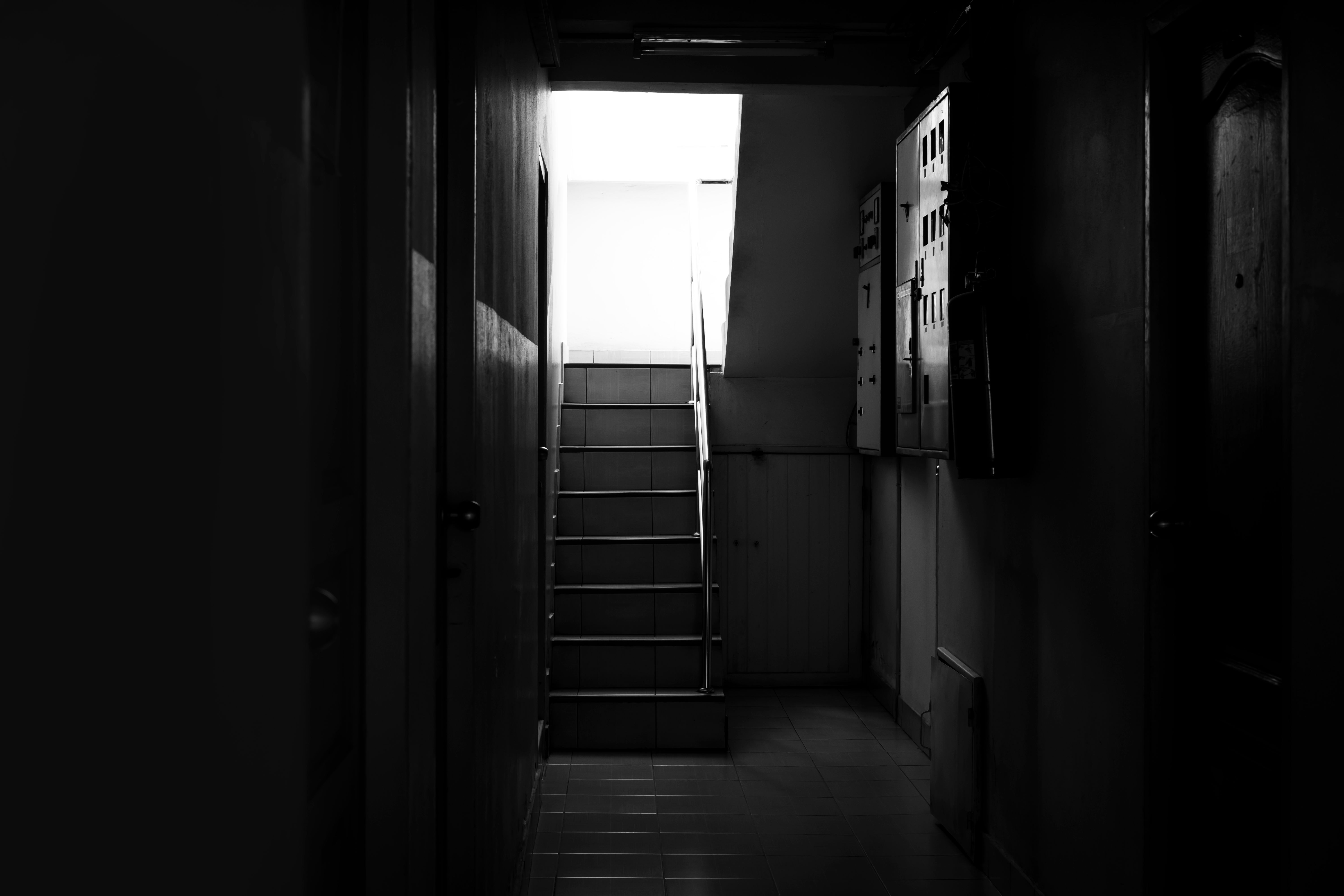
For illustration purposes only. | Source: Shutterstock
Panic surged like ink in water, spreading fast and dark. She sprang up, her artist's eyes scanning the room, noting the absence of a certain cherished disarray that only a child could bring.
“Lizzy!?" Her voice cracked the dawn's quiet, her call met with an eerie hush.
Each room became a frame, empty of its most precious subject. Joan's mind raced with images of her daughter's smile, her laughter a melody now painfully distant. "Lizzy!" Desperation etched itself into the syllables.
The realization struck like a brushstroke of black across a vibrant canvas; Lizzy was gone. Essence turned to essence, her mother's heart entwined with the girl's spirit, now torn away. In despair, Joan grabbed the phone, the numbers she dialed a lifeline thrown into an abyss.
"Police, please hurry," she urged, her voice a tightrope between fear and fury. They promised swift action, officers dispatched like hounds on a scent. But Joan knew this was no ordinary hunt; this was a search for her soul's reflection, her daughter.

For illustration purposes only. | Source: Shutterstock
As the house filled with the trappings of an investigation, each officer’s step seemed to echo the rhythm of Joan's pulse—taut, relentless, alive with the fight of a mother against the world.
With a rhythm that betrayed impatience, Joan's boots tapped against the weathered wood of her porch. The air was thick with the scent of pines and an undercurrent of fear. Her gaze, sharp as chisels, chipped away at the façade of calm that Sheriff Tom Foster wore like a second skin.
"Joan, you need to consider selling," Foster murmured, his voice a low rumble in the quiet morning. His eyes, once a beacon of authority, now dodged hers like guilty shadows.
"The house, it's Ring's legacy. These people, they're stuck in his world, in his time." He gestured vaguely, encompassing the intangible weight of history and expectation.
"Legacy?" Joan's voice rose, slicing through the veil of his excuses. "My daughter is missing because of some archaic sense of pride? No!"
She pounded a fist against the hood of his cruiser, her knuckles whitening.
"You find her. You do your job!"

For illustration purposes only. | Source: Shutterstock
Foster's mouth tightened, a dam holding back words he dared not release.
As he turned to enter his vehicle, Joan's artist's eye caught a flash of crimson—a red thread, coiled and knotted into a shape unfamiliar, yet sinister, dangled from his rearview mirror. Her heart thrummed a staccato beat, a crescendo of realization.
"Something to say about this, Sheriff?" she demanded, her finger accusingly pointing at the red talisman.
"Old superstitions," he muttered, evasive. "Keeps the bad luck at bay."
"Or invites it," Joan countered, her mind painting the connection between the thread and the warnings, the threats woven into the fabric of their lives. With each revelation, the tapestry of this town revealed more of its grim pattern.
The Sheriff, a man torn by duty and tradition, started his engine, leaving Joan standing alone, but unyielding.

For illustration purposes only. | Source: DaLL-E
Her resolve was a fortress; her will, an unbreakable thread. They wanted her gone, but she would not be erased—not from her home, nor from the narrative they sought to impose upon her.
As the car faded into the distance, Joan turned back to the empty doorway of her home. The silence beckoned, a canvas awaiting her next defiant stroke.Joan Whitmore's heart thrummed against her ribcage like a caged bird desperate for flight. It was twilight, the sky a canvas of deep purples and fading oranges, and she stood half-concealed behind the gnarled trunk of an old oak tree.
She watched Sheriff Tom Foster's cruiser glide into the gravel driveway of his weathered Victorian home, the tires crunching softly on the stones.
She had been tailing the sheriff discreetly, determination etched into every line of her slight frame.
Her intuition, honed through years of standing firm against societal currents that sought to sweep her away, had whispered insistently that he held the key to the questions churning in her mind.

For illustration purposes only. | Source: Shutterstock
The engine cut, and silence fell over the property, save for the whisper of wind through autumn leaves. Joan waited, her breath forming small clouds in the cooling air.
The front door swung open, and the sheriff stepped out, his silhouette broad and imposing against the warm light inside.
"Ellie!" His voice boomed, laced with a fury that belied the calm of the evening.
"Have you completely lost your mind? Kidnapping children!?"
Joan's pulse quickened as she edged closer, ducking beneath the low-hanging branches to better hear the confrontation unfolding within.
"Do you have any idea what will happen if someone finds out!?"
Sheriff Foster continued, the words striking Joan with the weight of a physical blow.
Ellie's pale blue eyes, usually so cool and collected, were now wide with something Joan couldn't quite place—was it fear? Defiance?
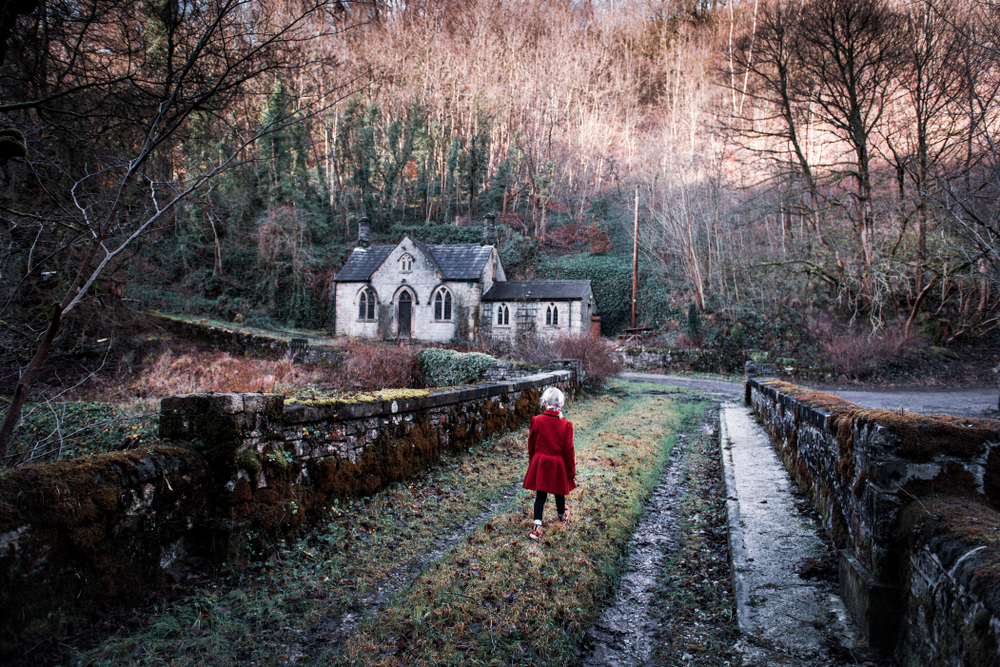
For illustration purposes only. | Source: Shutterstock
The sheriff's face, a landscape of deep lines and crevasses, was darkened by shadows and wrath.
He had always been a pillar of authority in their small town, but now he seemed a man grappling with a tempest within, his loyalty to his daughter warring with his sense of duty.
He had tolerated Ellie's peculiarities, her obsession with the town's antiquated values, but there was a limit to even his patience, and it appeared she had crossed it.
Joan could see the strain of the moment pulling at him, a tug-of-war between the love for his child and the law he had sworn to uphold.
From her hidden vantage point, Joan felt the icy tendrils of dread snake around her heart. The implications of what she was witnessing began to crystallize in her mind, sharp and shattering.
She knew, with a sinking certainty, that the search for her own daughter had been stymied by the very person who should have been leading it.
Sheriff Foster's rage-filled admonishments echoed in the still night, a stark contrast to the serenity of the home that held a secret darker than the approaching night.

For illustration purposes only. | Source: Shutterstock
Joan's resolve hardened; she would stand against this storm, against all odds, for her daughter and for truth.
In the quiet aftermath of the sheriff's outburst, Joan withdrew deeper into the shadows. Her thoughts swirled with the brushstrokes of justice and the colors of courage.
She was a woman alone against the world, but she was undaunted. Her path lay clear before her, though it twisted through territory treacherous and unknown. She would follow it to the end, wherever it might lead.
Ellie's voice, a chilling monotone, cut through the silence that had settled after her father's tirade.
"Dad, she's corrupt, she didn't want to leave, I warned her, she stayed anyway..." Her words hung in the air like an unsettling mist, her blue eyes wide with a fervor that bordered on madness.
Joan, crouched behind a hydrangea bush dense with summer’s last blooms, felt a cold shiver run down her spine.
The calmness in Ellie's voice was more terrifying than any scream could have been. It spoke of conviction, of a belief so strong and twisted it had upended her own moral compass.
Tentatively, Joan shifted her position for a better view, her muscles protesting the stillness they had been subjected to. She peered through the window where domesticity was being poisoned by an undercurrent of lunacy.

For illustration purposes only. | Source: Shutterstock
Her breath caught when, in the periphery of the confrontation, she glimpsed a figure moving—small and hesitant.
It was a girl dressed in an antiquated uniform—stiff, gray, utterly out of place in the modern world, yet hauntingly familiar. Joan's heart clenched painfully as she recognized the figure.
There, in a room suffused with soft yellow light and lined with books that preached control and order, was her daughter. The same strange outfit clung to her young frame, an outfit Joan had seen etched in black and white in an article about Stephen Ring's school for girls.
The sight was a grotesque echo of a past that Joan had fought to keep at bay, but it was now ensnaring her daughter in its outdated grasp.

For illustration purposes only. | Source: Shutterstock
The Sheriff's betrayal was no longer a whisper in the dark; it was a clarion call to action. Joan Whitmore, artist and mother, would answer that call.
Joan hammered the "For Sale" sign into the frost-tinged earth of her front lawn, each strike a resolute echo in the quiet morning air.
A mist clung to the ground, wrapping around her ankles like spectral fingers, as if the land itself was reluctant to let her go. Her movements were deliberate, the physical exertion a temporary balm for the tumult within.
Sheriff Foster's cruiser rolled up, gravel crunching under its weight. He stepped out, his stature imposing against the backdrop of the small-town landscape. His face, usually an unreadable mask of authority, bore faint lines of concern today.
"Joan," he started, his voice carrying a baritone of certainty that belied the situation's grim reality, "putting up that sign... it's the right thing. The kidnappers will see you're serious. They'll bring Lizzy back."

For illustration purposes only. | Source: Shutterstock
She didn't waver, her gaze steady as she turned to him. "I have to believe that, Tom." Her words were a whisper, yet they carried the weight of her conviction.
Joan had always been a fortress, her spirit undaunted even when the world seemed to conspire against her.
As they stood there, the silence between them stretched taut, a sudden burst of energy shattered the stillness.
Lizzy, her wavy chestnut hair wild from running, rushed toward the house, her small form a beacon of hope amidst the despair.
"Mom!" she cried out, her voice laced with fear and relief.
Joan's heart leapt into her throat as she caught sight of her daughter.
Dropping the hammer, she sprinted forward, sweeping Lizzy into her arms, holding her as if to absorb all the terror the child had faced.

For illustration purposes only. | Source: DaLL-E
The embrace was fierce, a mother's protective shield reassembled in an instant.
"Everything's okay now, baby," Joan murmured, stroking Lizzy's hair. Relief washed over her, mingling with a renewed surge of defiance.
Lizzy’s eyes, so much like her own, met hers. "I was so scared, Mom. But I knew you'd find me."
"Always," Joan promised, her voice a soft vow.
She straightened up, addressing the gathering crowd that had followed the Sheriff, their faces a mosaic of curiosity and concern.
"My house is for sale," she announced, her tone leaving no room for argument. "If any of you are interested, you're welcome to look around.
It's important to me that whoever lives here next understands what this place means... and ensures it remains a home worthy of its past."

For illustration purposes only. | Source: Shutterstock
Her statement hung in the air, a challenge thrown to the winds of change that swept through the town. Joan Whitmore would not be easily shaken - her art, her convictions, and her love for her daughter were testament enough to her unyielding spirit.
The townsfolk shuffled through the front door into Joan's living room, their eyes scanning the walls with a mix of anticipation and dread.
The air was thick with whispers as they stepped deeper into the heart of Joan's world—a house that once belonged to Stephen Ring, a man whose legacy was as oppressive as the silence that now fell upon the crowd.
"Good Lord..." someone gasped, breaking the hush.
Obscene images plastered on the walls snarled at them, mocking depictions of Stephen Ring in grotesque caricatures that left no room for misinterpretation.
The town's patriarchal ghost, stripped of dignity, exposed in vulgar strokes—Joan’s silent protest against the suffocating grip of history.
"Disgraceful," another voice added, tinged with disgust.

For illustration purposes only. | Source: Shutterstock
But as they moved into the hallway, a collective intake of breath shifted the focus from the past to a more unsettling present.
Photographs, not of art, but of evidence, were glued methodically along the corridor.
Each image a damning revelation: Sheriff Tom Foster and Ellie, his daughter, standing guard over a frightened Lizzy, bound and robbed of her childhood innocence.
"Tom, what is this?" It was an accusation wrapped in disbelief, thrown by a man who had looked up to the Sheriff as the town’s moral compass.
The Sheriff's voice faltered, his authority crumbling under the weight of his own betrayal.
"It's not what it looks like," he stammered, but conviction had abandoned him, leaving behind only the shallow breaths of a cornered man.
"Ellie?" Joan's voice was calm, edged with steel, demanding an answer she already knew.
In the ensuing silence, Ellie's blue eyes, once brimming with misguided fervor, now drowned in the realization of her unraveling. There was no place left to hide, her façade shattered by the truth adhered to the walls for all to witness.

For illustration purposes only. | Source: Shutterstock
"Momma," Lizzy whispered, tugging at Joan's sleeve, her small frame trembling.
"Shh, my brave girl," Joan soothed, wrapping her arm around Lizzy, shielding her from the storm of judgment that was about to break.
Days turned into hushed conversations, hurried decisions made behind closed doors. The Sheriff, once a pillar of the community, was stripped of his badge, the weight of his paternal love having blinded him to justice.
Ellie, lost in the labyrinth of her own mind, found herself in the sterile confines of a psychiatric hospital, her quest for recognition ending in seclusion rather than vindication.
With the dust settling on the upheaval, Joan stood outside, the 'For Sale' sign beside her swaying gently in the breeze, a silent sentinel to the end of an era.
She took one last look at the home that had cradled her defiance, then turned her back on the town that had become too small for her spirit.

For illustration purposes only. | Source: Shutterstock
"Where will we go?" Lizzy's voice was steady, a reflection of her mother's resolve.
"Somewhere new, somewhere we can start fresh," Joan replied, her gaze fixed on the horizon. "Together."
As they drove away, Joan's rearview mirror captured the receding image of a town too entrenched in its ways to move forward.
But Joan Whitmore was a force of nature, and her artwork was a testament to her resilience. Alongside Lizzy, she was already painting a future where women need not stand against the world but can shape it with their own hands.
Tell us what you think about this story, and share it with your friends. It might inspire them and brighten their day.
If you enjoyed this story, read this one: Margaret had confidence in her happy 20-year marriage. They have never had secrets, and she always has free access to her husband's phone and social networks. But once, her life was turned upside down when she found out her husband had another phone. Read the full story here.
This piece is inspired by stories from the everyday lives of our readers and written by a professional writer. Any resemblance to actual names or locations is purely coincidental. All images are for illustration purposes only. Share your story with us; maybe it will change someone’s life. If you would like to share your story, please send it to info@amomama.com.
